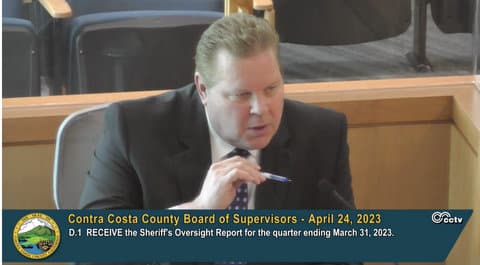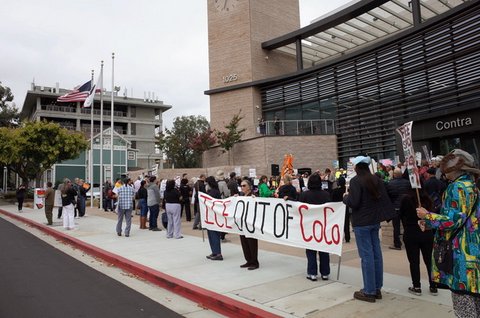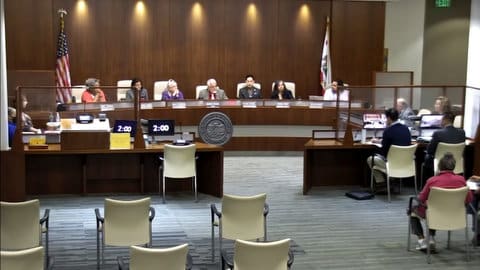
25 Apr Sheriff Addresses Mental Health Crisis Response

Contra Costa County Sheriff David Livingston spoke to the Board of Supervisors on Monday. (Screenshot captured by Julia Métraux / The CC Pulse)
By Julia Métraux
In Contra Costa County, if someone is experiencing a mental health crisis and might be put under a 5150 hold, police officers are more likely to respond to a call than a trained mental health professional.
“We’re still the ones responding to 95% of 5150 calls,” Contra Costa County Sheriff David Livingston said at a Contra Costa Board of Supervisors meeting Monday. “I think people should take confidence that we’re not there to escalate.”
>>>Read: Police Adapting to Changing Expectations, Says Acting Richmond Chief
A 5150 hold allows for people to be hospitalized involuntarily if they are considered to be a risk to themselves or others due to their mental health for up to 72 hours in the state of California. Across the United States, there has been criticism about the police responding to mental health calls and other interactions police have with those who have psychiatric and/or intellectual and developmental disabilities. Roughly half the people in the United States killed by a police officer has a disability, according to a 2016 report from the Ruderman Family Foundation.
Supervisor Candace Andersen asked Livingston how “we prepare them to really deal” with people who may be experiencing a mental health crisis.
“Every deputy receives a minimum of eight hours of crisis intervention prevention training,” Livingston said.
He said that deputies “also have implicit bias training.”
“It’s particularly critical for police officers and for deputy sheriffs that are in the front line making split-second decisions, to be aware if their actions are being colored by implicit bias,” Livingston said.
Livingston also said police officers are taught “how to watch” to see if any of their colleagues’ actions are driven by implicit bias, such as anti-Black racism. Last week, it was reported that 45 police officers in Antioch were on chains where homophobic and racist text messages were shared.
While it was not discussed during Livingston’s presentation to the Board of Supervisors, Richmond’s Reimagining Public Safety Community Task Force is working on a plan for the city to have a non-police response for people experiencing a mental health crisis. Except for unincorporated areas, police responding to alleged mental health crises are largely from an individual city’s police force and not Contra Costa County’s.
>>>Read: Contra Costa Unveils New Crisis Initiative for Behavioral Emergencies
The hotline 988 was also launched last summer as an alternative to calling 911. However, some people have raised concerns about this hotline, as police officers may still be dispatched for these calls.
Supervisor John Gioia asked if there was “data on mental health diagnoses,” as previously requested by Contra Costa Health Services’ Mental Health Commission, of incarcerated people, as well as data on the race of people arrested in the quarterly reports.
Livingston said that specific data is not available due to the Health Insurance Portability and Accountability Act of 1996, widely known as HIPAA.
“Anecdotally, we’re probably 40%-plus of inmates that are currently under active mental health treatment, which may be mild or may be more severe,” Livingston said.
Responding to Livingston, Supervisor Diane Burgis said that number likely does not paint an accurate picture.
“You said 40%, in the jail system, but that’s diagnosed,” Burgis said. “We don’t know really how many people are suffering from adverse childhood experiences, trauma.”
People who live with mental health conditions are disproportionately in United States jails and prisons. There is not discernable link between living with a mental illness and being a perpetrator of violence. According to the Substance Abuse and Mental Services Administration, “only 3%–5% of violent acts can be attributed to individuals living with a serious mental illness.”
People with mental health conditions are more likely to be the victim of violence.






No Comments